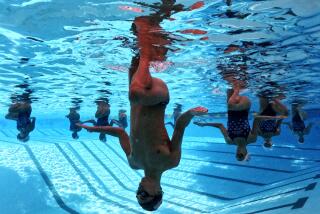DeBus Suspended for Life by TAC : Track and field: Panel says coach was guilty of providing his athletes with performance-enhancing drugs.
Chuck DeBus, a Los Angeles track and field coach, has been suspended for life by The Athletics Congress for his alleged role in promoting the use of performance-enhancing drugs by athletes he coached.
A three-person panel of TAC, the sport’s governing body in the United States, found in an opinion released Tuesday that DeBus was guilty of “inciting athletes to use banned substances, guilty of providing banned substances to an athlete, and guilty of conduct detrimental to the purposes of The Athletics Congress and amateur sports.”
The lifetime ban on three counts is the strongest action the panel could take under the rules. DeBus was given a 15-year suspension on another count. It is the first time an American coach has been sanctioned under rules regarding drug use or distribution.
A TAC news release stated that DeBus was suspended from track and field for life, but it is unclear if that is wholly accurate. According to the release, the panel’s decision expelled DeBus from TAC. That means that DeBus may not coach any national teams such as the Olympic team and may not enter athletes into TAC-sanctioned events.
That might be the limit of the sanction. It does not appear to prohibit DeBus from coaching any athlete he chooses.
A panel member conceded that the decision does not prevent DeBus from coaching, saying, “I don’t see how it could, other than what it does for his reputation.”
A TAC spokesman said he did not know what the appeals process is in this case but that the question is “under review.”
TAC said miler Steve Scott and hurdler Tonie Campbell testified before the panel last April that DeBus urged them to take banned substances. Darryl Robinson, a 400-meter specialist, testified that DeBus had given him banned substances.
The TAC release quotes the 52-page opinion as saying Scott told the panel that in 1987 DeBus offered to assist him in setting up a program of blood doping and/or steroid use. Campbell said that during the 1985 season DeBus told him that steroids would improve his ability, and Robinson testified that DeBus had assisted him in obtaining and using steroids from 1985 through ’87.
At the hearing, DeBus said he “did not encourage drug use; absolutely did not incite drug use, had never used drugs, had never purchased drugs, had never been arrested for drugs and had never possessed drugs.”
DeBus, 45, has coached at UCLA and Cal State Northridge, where his women’s teams won four national titles. He also coached the now-defunct Los Angeles Track Club from 1971 through ‘88; the club won nine TAC team titles. DeBus had been under investigation since May of 1989, when some of his former athletes made public allegations that he had offered or provided banned substances.
DeBus’ attorney, Craig Dummit, said Tuesday that the decision was more a public relations announcement than anything else. He said that he intended to exhaust all appeals within TAC and then, if necessary, take DeBus’ case to civil court.
“TAC won the first round using themselves as judges,” Dummit said. “Once we get a neutral judge in court, we will score a quick knockout.”
The panel consisted of William Hickman, a Seattle attorney; Julie McKinney, a San Pedro attorney, and Rich Nichols, a San Francisco sports consultant.
McKinney said the panel members were not trying to send a message with the lifetime suspension, merely adhering to the rules.
“I don’t now what the legislative intent (of the rules) was, but my own opinion is that a person who is in a position of dominance over athletes (and advises them to use drugs) should be dealt with strongly,” McKinney said.
She said that although the panel was offered no physical evidence or any evidence to corroborate the testimony of the three athletes, the panel members believed the athletes were credible.
The hearing process for DeBus has a fitful history, having been rescheduled six times. At one point, an attorney for TAC and DeBus struck a deal by which the coach would voluntarily step down from the sport for two years in exchange for the names of athletes DeBus said were drug users. However, the deal fell through when the panel members protested. TAC attorney, Alvin Chriss, has since resigned.
In April, the TAC panel held a hearing at a hotel near Los Angeles International Airport. After two days of testimony by Scott, Robinson, Campbell and DeBus, the panel adjourned without rendering a decision.
The opinion was formulated over three months and a handful of conference calls among the three members.
More to Read
Go beyond the scoreboard
Get the latest on L.A.'s teams in the daily Sports Report newsletter.
You may occasionally receive promotional content from the Los Angeles Times.






